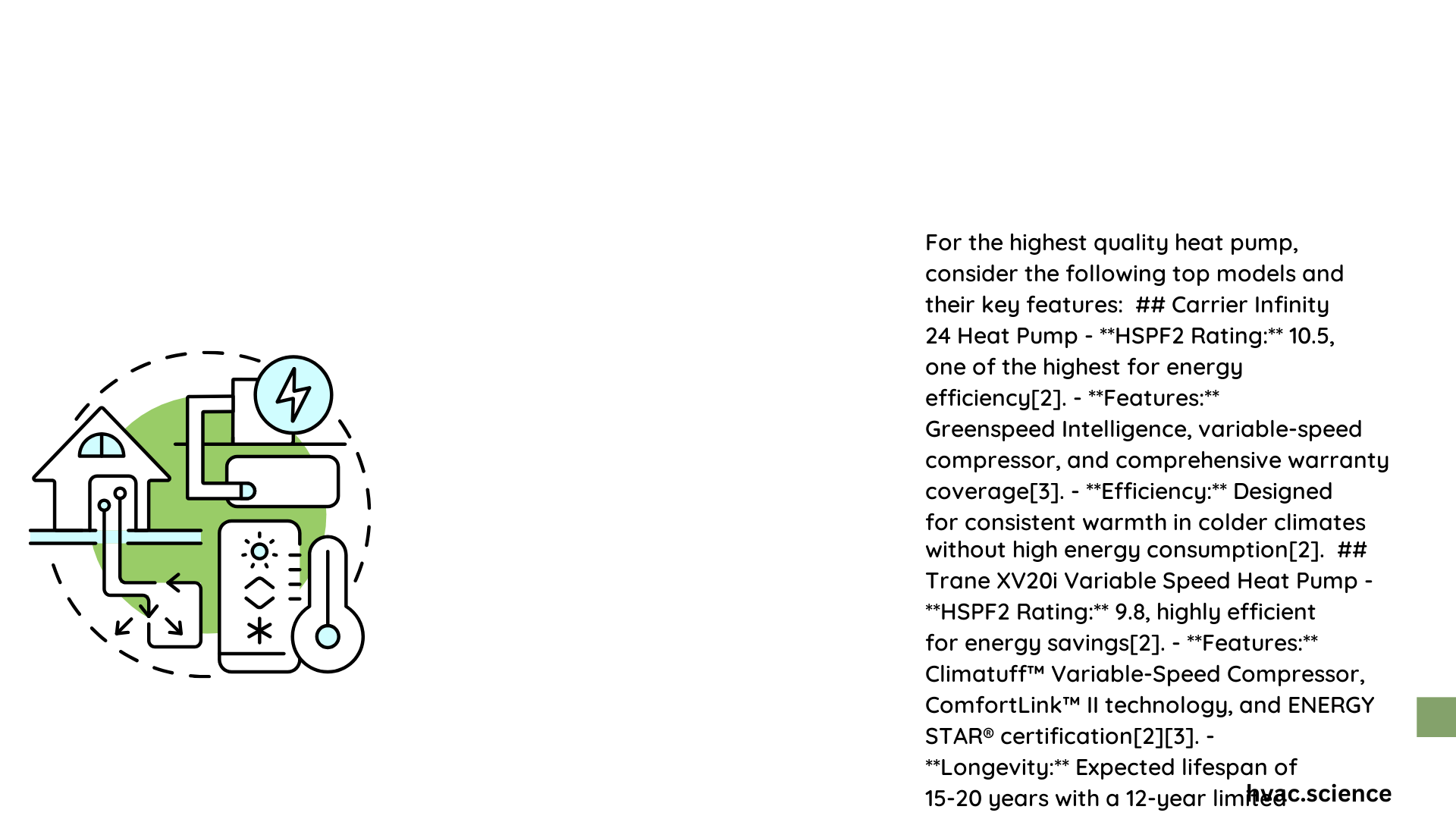Heat pumps represent a revolutionary technology in home heating and cooling, offering unparalleled energy efficiency and environmental sustainability. The highest quality heat pump systems combine cutting-edge engineering, superior performance ratings, and intelligent design to provide homeowners with exceptional temperature control, reduced energy consumption, and long-term cost savings across diverse climate conditions.
What Makes a Heat Pump High Quality?
Heat pumps are distinguished by several critical performance metrics that define their overall quality:
Performance Metrics
- Seasonal Energy Efficiency Ratio (SEER)
- Heating Seasonal Performance Factor (HSPF)
- Coefficient of Performance (COP)
- Temperature Range Adaptability
- Noise Level
Top Performers in Heat Pump Technology
Carrier Infinity Series
- Key Features:
- Greenspeed Intelligence
- Variable-speed compressor
- WeatherArmor Ultra protection
- SEER Rating: Up to 25.0
- Noise Level: As low as 56 decibels
Lennox XP25 Heat Pump
- Technological Advantages:
- SilentComfort technology
- iComfort S30 smart thermostat integration
- SEER Rating: Up to 23.5
- Precision engineering
Efficiency Comparison Table
| Brand | SEER Rating | HSPF Rating | Noise Level | Price Range |
|---|---|---|---|---|
| Carrier | 25.0 | 13.0 | 56 dB | $8,000-$15,000 |
| Lennox | 23.5 | 10.2 | 59 dB | $9,000-$16,000 |
| Daikin | 22.0 | 10.0 | 57 dB | $7,000-$14,000 |
| Trane | 22.0 | 10.0 | 58 dB | $8,500-$15,500 |
How to Select the Highest Quality Heat Pump?

Crucial Selection Criteria
- Climate Compatibility
- Home Size and Insulation
- Energy Efficiency Ratings
- Installation Complexity
- Budget Considerations
Advanced Technology Indicators
- Inverter-driven compressors
- Smart home integration
- Multi-stage heating/cooling
- Environmentally friendly refrigerants
- Comprehensive warranty coverage
Maintenance Strategies for Peak Performance
Recommended Maintenance Practices
- Annual professional inspection
- Regular filter replacement
- Clean outdoor unit quarterly
- Monitor refrigerant levels
- Check electrical connections
Cost-Benefit Analysis
Long-Term Savings Potential
- Energy Cost Reduction: 30-50% compared to traditional HVAC
- Carbon Footprint Reduction: Significant environmental impact
- Potential Tax Credits: Federal and state incentives available
Expert Recommendations
Professional Installation Considerations
- Certified HVAC technician
- Proper sizing assessment
- Comprehensive system evaluation
- Energy efficiency calculations
Emerging Technologies
Future Heat Pump Innovations
- Enhanced cold-climate performance
- AI-driven temperature optimization
- Increased renewable energy integration
- Improved refrigerant technologies
Conclusion
Selecting the highest quality heat pump requires careful evaluation of performance metrics, technological features, and individual home requirements. Brands like Carrier, Lennox, and Daikin lead the market with exceptional engineering and efficiency.
Key Takeaways
- Prioritize SEER and HSPF ratings
- Consider climate-specific performance
- Invest in professional installation
- Plan for long-term energy savings
References:
– ENERGY STAR Heat Pump Guidelines
– Department of Energy HVAC Recommendations
– HVAC Technology Insights
